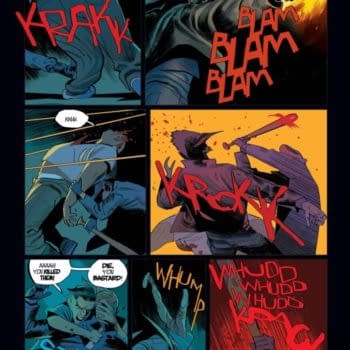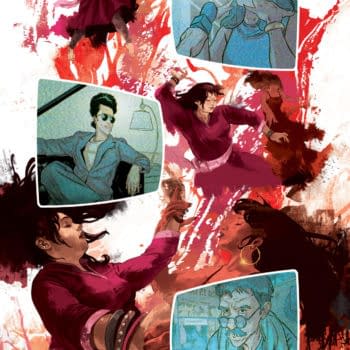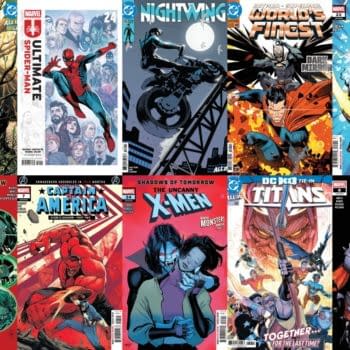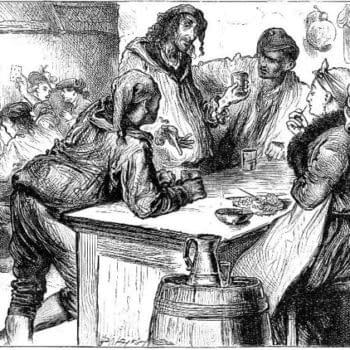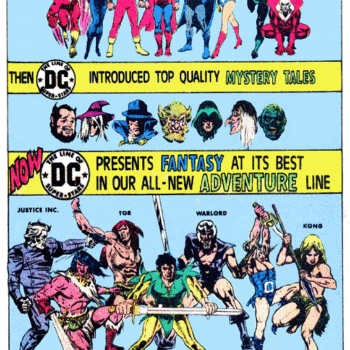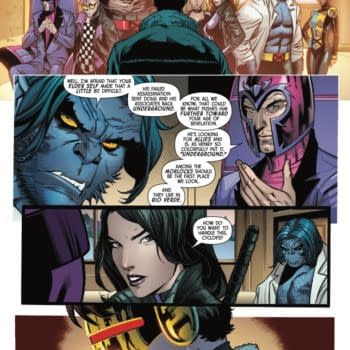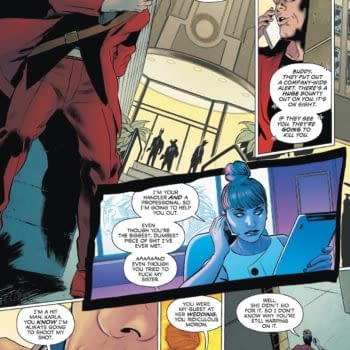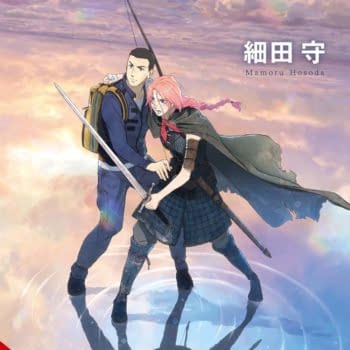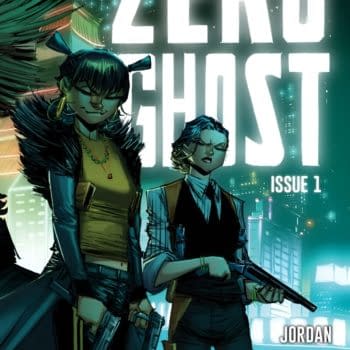Posted in: Comics | Tagged: amy reeder, Comics, entertainment, joe glass, Kate Leth, Marguerite Bennett, Tana Ford, tbf15, Thought, thought bubble
Kate Leth Can't Say Whether Patsy Walker, Hellcat Is Queer. Yet. The Queer Comics Today Panel At Thought Bubble #TBF15

It was made up of Bleeding Cool's own Joe Glass, Marguerite Bennett, Kate Leth, Amy Reeder and Tana Ford and they began by apologising for their whiteness. Plenty of panels at the festival were equally as ethnically diverse, they were the only one who felt the need to apologise for it. This set the tone for a number of discussions, specifically how representation encourages participation, with Ford citing the American black female astronaut who only aspired to such a role after watching Uhura in Star Trek and believing such a thing was possible for her.
Glass seized upon his experience with the X-Men, enjoying what he saw as a homosexual allegory but believing subtext wasn't enough, which led him to create his comic The Pride, but also how even with a nine-strong cast there are plenty of queer life experiences which he doesn't have room to portray effectively – which is why he sees a need for other comics to step up and tell different stories with different kinds of people.
Ford also talked about making her lesbian comics at a time when what comics existed seemed to be concerned more with older, more middle-class issues whereas she wanted to read – and wrote and drew about drinking, dancing and finding girls to hook up with.
Leth told us that it was never her thing to make queer comics for kids, as a writer she was more interested in writing about depression – and got hired to write kids comics as a result. So people know what they are getting – and she forewarns them that not everyone is going to be white and not everyone is going to be straight. She fiercely underlines the difference between sexuality and sexual content and that kids can handle it. "I didn't turn 18 and suddenly understand Angelina Jolie" as she put it. In Q&As later, Kate mentioned that in one of her projects, a character is asexual, but it just hasn't come up – and she's not sure how as she can't use anything with the word "sexual in it."
Reeder talked about how her work on Batwoman brought her not just gay fans, but also red headed fans and twin fans (spoilers), something she sees as a teachable lesson for representation in comics.
Bennett is frustrated at reading gay aspirational characters and never clicks with them. She talked about how she much preferred the likes of Poison Ivy and Harley Quinn because they didn't have to strive to be good – they just had to be themselves. The panel discussed problems with the "thin sliver of representation" with just not enough characters to explore identity and the gravity towards making a perfect representation of people brings, because that may be the only one.
Leth pointed the people who read comics are probably different to normal people, which does allow an audience to relate. But that identification does lead to people checking out work at least – she remembers picking up a certain comic simply because it starred a gay redhead….
Ford says that she lives in a "pink bubble", surrounded by gay friends, which gives her license to explore more difficult themes within that, such as "bi-phobia" in the gay community. Make her lead character Duck be biphobic , and creating the conversation she wants to have on the page.
Leth took this as an opportunity to talk about that issue, which is why she prefers to identify as Queer to avoid that very issue as some would have issue with her being bi. Reeder is bi, but welcomes that label, "call it what it is" but finds that some people interpret that as "ooh you're kinky" and thinks it might be smart to call herself Queer instead. Leth concurred with that response, saying that couples keep asking her to date them. She pointed out that if she dates a guy, she loses her lesbian friends, and when she dates a girl, they all return. But she doesn't lose straight friends when she dates a girl. Reeder told Leth that she needs better friends
It was probably at that point that I realised the difference for me between this panel and many others I've seen at different shows was a lack of need to accommodate or talk to a more general audience This was wasn't the usual Gay Comics 101. I wasn't being talked to anymore, but I was happy to observe and learn.
Ford wanted to also talk about trans representation in comics, clearly a hot topic at the moment, and also something I'd talked with her and Joe in the bar the previous night. Joe Glass talked about how creators are worried of writing such characters and stories for fear of getting it wrong and being slated on-line. Ford asked if they police their allies too much?
Glass said that was a real problem, and that all the creators on the panel could be subject to it to, when writing about characters outside of their own personal experiences, and that he knows that he is going t make mistakes. He is happy to learn, and correct if he can, but the anger he could face is an issue.
In questions and answers Kate talked about hating it when Tumblr is mad at her, and talked about how people can get blacklisted after making a mistake. That this can happen to any creator and that there has to be a desire for forgiveness. Bennett agreed, looking for rehabilitation rather than punishment.
But it doesn't have to be anger. Reeder pointed out that publisher's CEOs just want their customers to be happy which is why it's always worth speaking up.
Taking questions and answers, Bennett talked about the importance to writing a trans character in Angela is that they feel real and her relationship with Angela also felt real.
Ford loudly agreed with one questioner that too many gay characters in comics rely upon their sexuality to drive their conflict, rather than everything else in their life. Bennett pointed out that she feels that comics with a diverse cast have to do all the heavy lifting and, as Glass mentioned earlier, it would be nice if some other books might help out a bit.
The panel were asked about the recent outing of Iceman, and while they were happy with the final discussion between the two Icemen, the topic of bi-erasure was brought up, with the young Iceman's questions that he might be bi being shut down by Jean Grey. Glass, which still seeing the scene as problematic told the panel that it wasn't meant that way, even though Jean's invasive behaviour was never brought to book. And how he came out as bisexual first, even though he wasn't, and the scene in X-Men just fast forwarded that process. Ford pointed out how young and immature Jean is in the comic and that as a teenager she would have been far worse than Jean.
Kate Leth did despair at the idea of another media article just saying that another comic character was gay. So yes, as mentioned the title of this piece, Kate Leth was asked about the sexuality of the lead character in Hellcat AKA Patsy Walker she is now working on with Brittney Williams for Marvel. She replied "I can't tell you if Hellcat is queer. I can tell you that you know who I am" to laughter and applause, with her assurances that there would absolutely be representation in the comic.
It took a long time for that room to empty. The positive energy in the room was infectious and it looks like the panel, in whatever form it takes will return next year, in whatever month it takes…
And if I have made any mistakes, please forgive me. And help me correct them.








